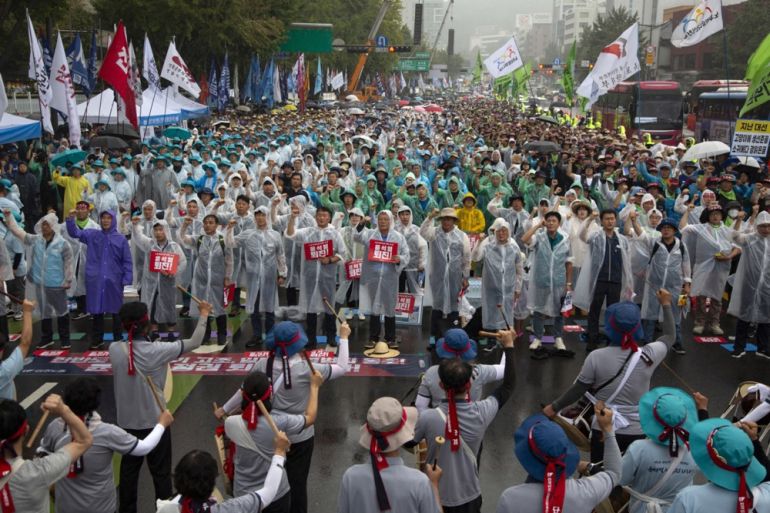Hundreds rally in S Korea against Fukushima wastewater release plan
Activists are unhappy with Tokyo’s plan to release treated radioactive water from Fukushima nuclear plant into the ocean.

Hundreds of South Korean activists have gathered in central Seoul to protest against Japan’s plan to release treated radioactive water from the tsunami-wrecked Fukushima nuclear power plant into the ocean.
Japan’s Asahi Shimbun daily reported earlier this week that the country plans to start releasing the water into the ocean as early as late August, citing unidentified government sources.
Keep reading
list of 3 itemsTokyo court upholds acquittal of Fukushima disaster executives
South Korea to keep Fukushima seafood ban despite thaw with Japan
“If it is discarded, radioactive substances contained in the contaminated water will eventually destroy the marine ecosystem,” said Choi Kyoungsook of Korea Radiation Watch, an activist group that organised the protest on Saturday.
“We are opposed… because we believe the sea is not just for the Japanese government, but for all of us and for mankind.”
Hundreds of protesters held up signs saying “Keep It Inland” and “Protect the Pacific Ocean!” while singing songs and listening to rally organisers.
Japan’s nuclear regulator last month granted approval for plant operator Tokyo Electric Power Company Holdings (TEPCO) to start releasing the water, which Japan and the International Atomic Energy Agency (IAEA) said is safe but nearby countries fear may contaminate food.
US President Joe Biden will meet Japanese Prime Minister Fumio Kishida and South Korean President Yoon Suk-yeol for a trilateral summit on August 18.
“There is talk that the dumping of contaminated water is on the summit agenda. The governments of South Korea, the US, and Japan should view it an environmental disaster, rather than a political issue, and agree to block it… for future generations,” Choi said.
A massive earthquake and tsunami in 2011 destroyed the Fukushima plant’s cooling systems, causing three reactors to melt and contaminate their cooling water.
TEPCO has been collecting, filtering and storing the water in hundreds of tanks, which will reach their capacity in early 2024.
Japan first announced plans to discharge the treated water into the sea in 2018, saying the water will be further diluted by seawater before being released in a carefully controlled process that will take decades to complete.
The water is being treated with what’s called an Advanced Liquid Processing System (ALPS), which is designed to reduce the amounts of more than 60 selected radionuclides releasable levels except for tritium, which officials say is safe for humans if consumed in small amounts.
Junichi Matsumoto, the corporate officer in charge of treated water management for TEPCO, pledged in a news conference last month to conduct careful sampling and analysis of the water to make sure its release is safely carried out in accordance with IAEA standards.